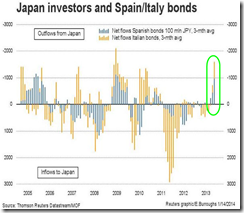2014 is turning out to be a very interesting year. Two months into the year, we have seen several bank runs (Thailand, Kazakhstan and Ukraine) and also we saw China’s bailout of a delinquent shadow bank.
Fresh reports say that cash strapped Rome has been bailed out by financially beleaguered Italian government.
From the South China Morning Post:
Decadent and in decline, its beauty imperilled by physical and moral decay, the Rome portrayed in Paolo Sorrentino’s film La Grande Bellezza could end up giving Italy a yearned-for win at the Oscars on Sunday night. But off-screen and far from the glitz of Hollywood, the financial troubles of the eternal city – and the daily trials of its long-suffering residents – are no cause for celebration.On Friday, at the end of a week which saw the spectre of bankruptcy loom large over the ancient capital, the Italian federal government said it had approved a last-minute decree that would give an urgently-needed injection of funds to the city, thus staving off imminent disaster.While not detailing the new plans, cabinet undersecretary Graziano Delrio said the sum to be transferred to the municipality “remains the same”– around 500 million euro (HK$5.3 billion) – as had been envisaged under a previous decree ditched earlier in the week by the government.Nicknamed “Save Rome”, that decree had become so bogged down in a verbose and venomous parliamentary process that Mateo Rienzi’s new administration withdrew it and said it would find a new way of helping the Rome authorities plug an 816 million euro hole in their budget.
So bailouts of financial boils appear to be a deepening global trend.
Mired in stagnation, it’s a wonder how Italy can afford to conduct such actions
Italy’s debt levels remain one of the highest in the Eurozone (chart from CFR)
And Italy’s economy continues to grapple with record level of unemployment.
chart from tradingeconomics.com
Italy’s unemployment rate rose to a record high in January, signaling that companies may fail to hire even after the economy returned to growth in the last quarter of 2013.Unemployment increased to 12.9 percent from 12.7 percent in December, the Rome-based national statistics office Istat said in a preliminary report today. The January rate is the highest since the data series began in the first quarter of 1977. The median estimate of five economists surveyed by Bloomberg called for an unemployment rate of 12.7 percent last month.
Not to worry, the bailout, which will likely be funded by more debt issuance, will benefit from the reemergence of Italy’s convergence trade as bond yields shrink to record lows.
This means zero bound interest rates will accommodate Italy’s spendthrift ways (chart from Danske Bank).
The reason for record low yields?
Italian banks have been stuffing their balance sheet with sovereign debt…
…as Japanese investors chase yields also by piling into Italian yields, notes the Zero Hedge. Rallying yields have been inspired by ECB’s Mario Draghi pledge to “do whatever it takes” to preserve the Euro
Italian stocks as measured by the FTSEMIB has also been booming.
So in Italy we see a parallel universe, stagnating economy in the face of booming stocks and bond markets. Convergence in interest rates and divergence in economic performance. Wonderful no?
And Rome’s bailout will add only to Italy’s economic woes via a larger debt burden and a shift of resources to uses of lesser value or more malinvestments.
On the political front, the Italian Prime Minister Enrico Letta recently resigned and has been replaced by Matteo Renzi who at the moment has been working to gather support for a coalition government. As noted by the Economist in 2013, in 67 years the Italian government has had 62 governments due to a highly fragmented political sphere.
So in order to gain broad political support, politicians will have to ensure doleouts to various interest groups, and Rome’s bailout has just been one of them.
So in spite booming markets, which is a sign of resource redistribution from the economy to the banking and political class, the Italian financial crisis still lingers and may resurface soon. Rome's bailout may have signified the proverbial "shot across the bow" of the periphery spreading to the core dynamic.
The Rome bailout also demonstrates why Eurozone is also a fertile candidate for a global Black Swan event.






No comments:
Post a Comment